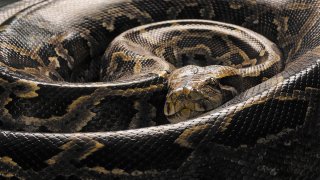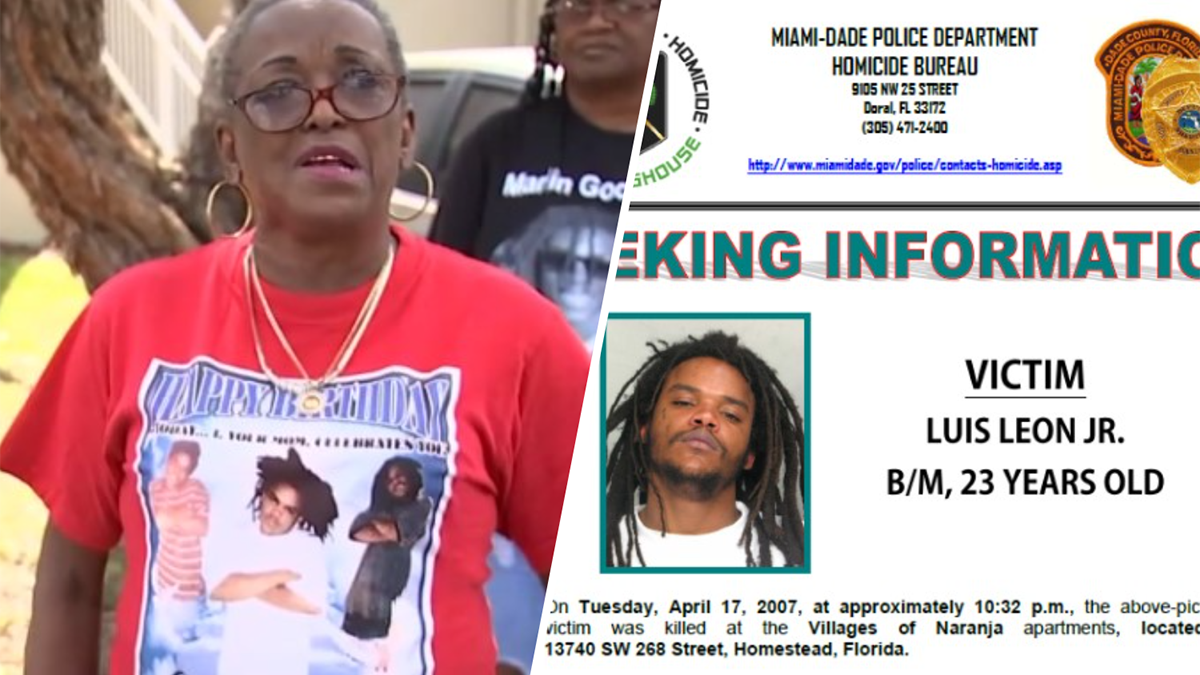
Across America, people are making coronavirus masks with everything from t-shirts and pillowcases to vacuum cleaner bags.
Because it’s Florida, one guy is using python skin.
Brian Wood, owner of All American Gator Products in Dania Beach, is crafting decorative mask coverings from the skin of the Burmese python, the infamous invasive species wreaking havoc on the native wilidlife of the Everglades.
“People are going to have to cover their faces, and unfortunately the situation may last longer than we imagined,” said Wood, owner of All American Gator Products in Dania Beach. “Some people want to make a fashion statement even during this pandemic, so I want to give them options.”
Get South Florida local news, weather forecasts and entertainment stories to your inbox. Sign up for NBC South Florida newsletters.
The python skin itself doesn’t provide protection but his designing a mask allows for a filter or a lining to be inserted and removed. He said he is is in talks with suppliers of filters and is considering using cloth because surgical-grade materials are scarce and in high demand by medical professionals.
He said that some masks may come with a filtration system like the N95 mask, which blocks very small airborne particles and currently is advised for use only by medical professionals treating patients with COVID-19, the respiratory disease caused by the novel coronavirus.
The python masks will be made with holes framed by black, silver or gold metal rings, which will add a hint of luxury to the items, he said. They will probably be secured with a band with a VELCRO closure, and will come in different colors and finishes. A metal nose clamp will help ensure a good fit, Wood said.
Local
“The designs are still in the early stages and I want to take advantage of the supply we have here not only of python skin, but also alligator and crocodile,” said Wood, who also has a pest control business that specializes in invasive iguanas. The prices will be “reasonable,” Wood said: about $20 to $40 for the skins plus the cost of manufacturing. Alligator skin, “the diamond of leathers,” would be more expensive, he added.
In line with recent guidance from the Centers for Disease Control and Prevention, more and more people are wearing masks in public settings. On social media, many people are making fashion statements with colorful hand-made face coverings with original prints and even embroidery. YouTube, Facebook and other social media are teeming with DIY videos on how to make cloth masks, allowing for some self-expression during the pandemic.
Miami-Dade ordered county residents to wear a mask in public spaces, defining a mask as a “covering which snugly covers the face and mouth” and which is secured with “ties or ear loops.”
Earlier in the week, the city of Miami stepped up the battle to slow the spread of the COVID-19 pandemic when officials mandated that everyone inside grocery stores, pharmacies and convenience stores wear face coverings. The measure also requires all delivery workers to don masks, as well as all construction workers on job sites.
Other cities around the country have issued similar orders, igniting demand for a full range of products, from basic handmade cotton masks sold on e-commerce site Etsy and on Amazon, to leather, monogrammed and lace-covered face coverings offered through online channels and social media.
There are even designer knockoffs, like a Louis Vuitton monogram mask that has circulated on Instagram. Self-described Russian influencer Tair Marassulov posed outside a Louis Vuitton store in Paris wearing what appears to be a leather mask with the iconic French luxury house’s monogram, along with a monogrammed jacket.
The company confirmed the mask in Marassulov’s selfie is not a legitimate Louis Vuitton product. Earlier this week Louis Vuitton said it repurposed some of its workshops in France to produce non-surgical masks to donate to healthcare workers in the frontline of the battle against COVID-19, said spokeswoman Emily Huang.
Though state lands are now closed for public use as part of the social distancing campaign, python removal agents for the state are still at work, and Wood hopes to do brisk business with them if the masks take off.
Wood, who also hunts alligators and used to supply luxury goods maker Hermes, said one 10-foot snake could potentially yield as many as 10 masks.
“People are telling me they want to buy 5, 12 of these masks, so I’ll definitely be buying snakes from local hunters.”



